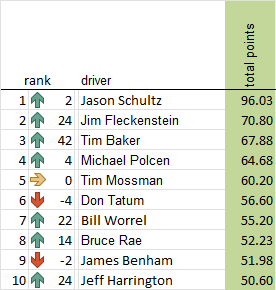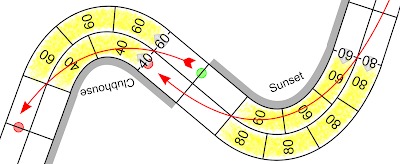As some of you probably know, I've been tinkering and testing some changes for the next edition of Championship Formula Racing.
I'm pretty sure this is where it will land. Specifically, I'm pretty sure about the forced passing bits. I'm 100% certain about the other bits.
So here they are.
Tests
In an effort to simplify down to two basic tables, Start Speed now has the same odds as testing any other attribute. A start speed failure results in a mis-shift and the loss of one wear. Start Speed is never damaged. I like removing the stall possibility. Losing your turn on the start when you were trying to go 120 is bad and I think the loss of a wear and a mis-shift is penalizing enough.
I also added a mis-shift to the failure result for Top Speed and Acceleration. I found it confusing that you would test top speed, fail and end up going faster this turn than your new, damaged top speed. I think having a mis-shift when you fail an Acceleration or Top Speed is more logically consistent. I think it also makes the rolls more impactful, especially at the end of the race. It is no longer a no-brainer to test your engine as you cross the finish line.
No change to testing deceleration. I just included the table here for completeness.
Forced Passing
This process underwent the most change. I wanted to end up with a single table for Forced Passing. I wanted to make it a little easier for the attacker, but not too easy. I wanted to change the interaction between the attacker and the defender.
The first change was to how "blocking" works. Instead of the defender just declaring that they are blocking to add 2 to the attacker's die-roll, the defender now has an opportunity to spend their own skill to add to the attacker's die-roll. Spun defenders may not. The attacker will still have an opportunity to add their own skill after learning what the defender is doing.
The odds obviously changed as well. On the one-hand success now occurs on any result 9 or less. But, a success of 7 - 9 also includes a wear damage to the attacker and the attacker must now roll on the Avoid Damage table. This could result in another wear lost and possibly a wear lost for the defender. The attacker may apply skill to this roll as well. The defender may not. If the defender is called on to lose wear, it does not matter if the defender used skill to hamper the attacker ("block") or not.
In the end, Forced Passing is easier to accomplish but will likely be more costly.
Avoid Damage
This table replaces the old Avoid Crash table but is now used both to avoid a crash as well as to avoid additional damage after a successful forced pass with contact.
On a 10-12, the result differs based on those two situations. If this roll resulted from avoiding a crash, the driver loses 2 wear. If this roll came after a forced pass then the attacker loses a second wear (since the attacker lost 1 on the forced passing table) and the defender loses a wear as well.
Slips at End
There is a game that can happen in the current rules -- If two cars are lined up with the finish line in sight and both cars can go 180. It's a dumb game. So, If you will finish the race this turn you may not take more than 1 slip.
Zero-base Car Builds
This isn't a rule change, but I am going to rejigger the car set-up table so that there are no longer any -1 values. All of the math will remain the same, but all of the number will be positive.







